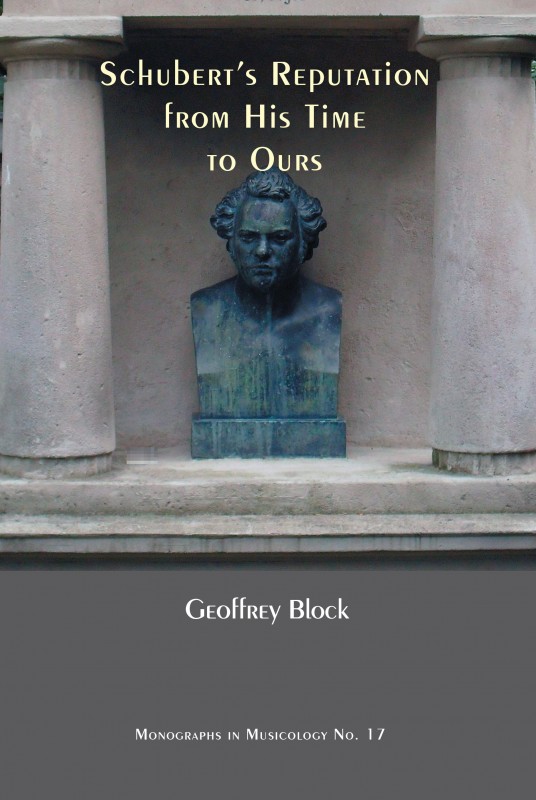Distinguished music historian tells the story of Schubert’s emergence from Beethoven’s shadow
TACOMA, Wash. – When The New York Times music critic Anthony Tommasini chose to put Franz Schubert near the top of his list of “The Greatest” 10 classical music composers of all time, Geoffrey Block knew he was on to something.
Since he was a teenager, the University of Puget Sound professor of music history had felt drawn to the introspective Austrian composer who lived in Beethoven’s shadow, and had sensed that there was a special touch of genius about Schubert’s copiously lyrical compositions, filled with striking harmonic surprises and original forms.
With his new book, Schubert’s Reputation from His Time to Ours (Pendragon Press, February 2017), Block tells the story of how the young Viennese schoolmaster and soon-to-be freelance composer, whose major instrumental works were little recognized in his own time, had lived, written profusely—completing some 1,000 works—and died at the age of 31, leaving behind a portfolio that eventually put him among history’s classical music giants.
“I was convinced that Schubert was grossly underappreciated,” Block said. “I didn’t know it yet, but the idea to write a book on the history of Schubert’s reputation was born during a semester when I taught Schubert as a special topic.
“For much of the past seven years I have been working to explain how and why Schubert gradually came to be acknowledged by a consensus of scholars and critics, as well as performers and audiences, as a creative coequal with his famous contemporary Beethoven.”
That gradual shift in the public and critical view over two centuries was distilled for all to see when New York music critic Tommasini, assisted by viewpoints from the public, listed Schubert behind only Bach, Beethoven, and Mozart in “The Greatest” list.
Block says it would be wrong to say that during his short lifetime Franz Schubert (1797–1828) was bereft of advocates. His songs were extremely popular, some of his larger works were reviewed favorably by critics, and although unverified, biographer Anton Schindler, who knew Schubert and Beethoven, reported that the latter, upon discovering several of Schubert’s manuscripts late in life, exclaimed “truly there is a divine spark in this Schubert.”
Over the next several generations influential champions such as Robert Schumann, Felix Mendelssohn, Franz Liszt, and Gustav Mahler recognized Schubert’s talent and advocated for his importance.
But it was not until the end of the 20th century that Schubert’s major instrumental works, chamber music, and song cycles, such as Winterreise (Winter Journey), Die schöne Müllerin (The Fair Maid of the Mill), the “Unfinished” and “Great” C Major Symphonies, the “Death and the Maiden” String Quartet, and the String Quintet in C Major fully came into their own. Critics and scholars revised their opinions and began to interpret Schubert’s departures from Beethoven’s formal and stylistic characteristics not as flaws, but as hallmarks of a new paradigm.
Music critics, Block says, have often described Beethoven’s work as exhibiting “masculine” traits, whereas Schubert’s work expressed more lyricism, melody, and song—traits historically regarded as feminine. As appreciation slowly grew for Schubert, his approach was “increasingly viewed as innovative and divergent, rather than defective and deviant,” the book jacket explains.
In Schubert’s Reputation from His Time to Ours, Geoffrey Block tells the story of how and why this happened. A distinguished author and editor, whose own first hero was Beethoven, Block writes with the passion and insight of a historian who has covered tremendous terrain across the musical cosmos, yet never lost the awe that comes with that first youthful encounter with genius.
Geoffrey Block is distinguished professor of music history at University of Puget Sound. He is the author of Ives: “Concord” Sonata (1996); Enchanted Evenings: The Broadway Musical from “Show Boat” to Sondheim and Lloyd Webber (1997, 2nd ed. 2009); and Richard Rodgers (2003). He was co-editor and contributor to Charles Ives and the Classical Tradition (1996); and editor of The Richard Rodgers Reader (2002) and two series of books on the American musical (Yale Broadway Masters and Oxford’s Broadway Legacies). Most recently Block published Experiencing Beethoven (Rowman & Littlefield, October 2017), a Listener’s Companion series book that offers all audiences an appreciation of the master’s work.
To purchase the book visit: pendragonpress.com/book.php?id=747
Press photos of Geoffrey Block and the book cover can be downloaded from pugetsound.edu/pressphotos
Photos on page: From top right: Book cover; Franz Schubert, by Wilhelm August Rieder (1875); Geoffrey Block
Tweet this: Story of #Schubert. 31yrs of genius, 200yrs B4 we knew it. Book by Geoffrey Block @univpugetsound #classicalmusic http://bit.ly/2m8WUgK
Follow us on Twitter! twitter.com/univpugetsound


